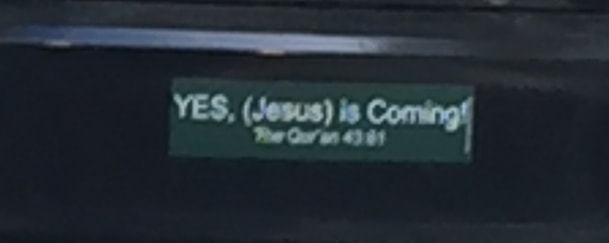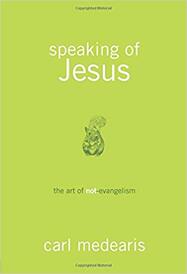 Recently, while I was searching for a new book to read on evangelism or its history, a friend recommended this book. Speaking of Jesus? I balked at the title. Do people really want to hear that name spoken? Isn’t it risky to speak of Jesus? I’ve found that even in Christian circles we often stumble over the name of Jesus or mumble it or rush past in our efforts to talk about God and what God is doing in our lives. And -- The Art of Not-Evangelism? What was that? My whole MO is to live out evangelism. What is this not-evangelism concept all about? Needless to say, as I began listening to the audiobook, I found myself in a dubious state, saying, “convince me.” Carl Medearis convinced me. What comes to mind when you hear the word Christian? In a casual survey of passersby, Carl Medearis found 50 out of 50 responses were negative. However, when he asked those 50 people what they thought of Jesus, their responses were positive. In his book Speaking of Jesus, Medearis outlines some reasons people may have, depending on their cultural background, for holding onto negative associations with Christians. For Americans, “Christian” might mean “conservative right wing Republican.” For those in the Middle East, “Christian” might mean “descendant of the crusaders or militants who kill Muslims.” For Europeans or Protestants, “Christian” might mean “some connection to the Roman Catholic Church, the Spanish Inquisition or selling the forgiveness of sins.” For those in the Far East or Africa, “Christian” might mean “Western imperialist.” I’ve talked to several Christians recently who would like to resist all labels in an effort to step away from all of that history and baggage. Some say they want to throw out the term “evangelical”. And some go as far to say they want to throw out the term “Christian”. One man I have gotten to know over the course of this year through church puts it this way: “I tell people I am someone who wants to get closer to Jesus. And I ask them, do you want to get closer to Jesus?” Medearis points out that Jesus himself was not a Christian. Jesus simply said, “follow me”, and if we can return to this simple truth in our own lives, if we can truly know the Gospel and follow him in our walk, it will open doors to speaking with more people about Jesus. Medearis claims that people don’t have to believe in God first in order to hear about Jesus. He points out that we often seek to share our faith by trying to follow a step-by-step plan to convince people more and more of our theology. He says all of that is unnecessary if we would only keep the main point the main point and speak of Jesus. “Do you know Jesus?” It’s a question, he says, to ask ourselves and to ask others. Last fall I saw this message from the Quran on a bumper sticker: What does it mean? Why would the Quran speak of Jesus? I felt a thrill rush through me when Medearis, who has worked and lived in the Middle East, pointed out that the Arabic name for Jesus is Isa and is mentioned over 80 times in the Quran as Islam’s only sinless prophet. Isa! I knew that name. A former Muslim coworker of mine had named her son Isa. I must ask her about this, I decided. Over email she readily shared her beliefs about Jesus as a prophet born of a virgin birth and that he was returning to earth someday. I have so much more to learn from her, and she encouraged me to continue my pursuit of interfaith discussions stating that we had more in common than people realize. I’m not saying I’m converting to Islam. I’m just saying that I want to know more about what people think about Jesus. He is the reason the world changed 2000 years ago, and yet, the Christianity we see around us too often focuses on theology, apologetics, politics and other causes that we miss opportunities to return to the main point. Medearis points out that for the Eastern world, Jesus is a folk hero, a man of the people “like Robin Hood.” Medearis claims that our Western focus on the cross misses an opportunity to allow him to be a man and understand his time on earth. What do you think of when you hear the name Jesus? Who is he to you? Medearis suggests there are three ways we can learn to know him. First, we know him by what we read about him through the four gospels (Matthew, Mark, Luke and John). Second, we know him by eating him -- by accepting him through communion. And third, we know him by practicing to act like him. For me, I have decided to reread the Gospels, beginning with John, in order to know the stories through and through and take the time to digest them all over again. If you have felt called to evangelism at times in your life, consider picking up Medearis’ book for a fresh perspective on what he calls “the art of not-evangelism” in order to focus your conversation on Jesus. “I am the vine; you are the branches. If a man remains in me and I in him, he will bear much fruit; apart from me you can do nothing.” (John 15:5) The book’s thesis is very simple: “Be nice, and talk about Jesus all the time.” Go, and see the fruit that God grows through you.
2 Comments
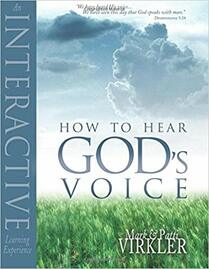 “I don’t think God is real,” my son said to my husband. “Why is that?” my husband asked. “Because I can’t hear him when I pray,” my son replied. My husband fished for an example of a Berenstain Bears book when Brother Bear learns a lesson about prayer, but my answer was more personal. It definitely got my son’s attention. “I struggle to hear God too,” I told him. “In fact, I shared this with a friend recently and she gave me a book called How to Hear God’s Voice. I’m reading it right now.”
“Really?” my son looked even more confused. “Sure. Learning to wait for God to answer is something even grown-ups need to work on.” At that point, given his age, I decided that was enough of an explanation for one day. He looked satisfied in the uncertainty of it. Once he could accept this, like so many things in life, as a learning process, he let go of his need to know what was going on. I resolved to let him know, slowly, in natural nugget-sized portions, how and when I saw God or heard his voice. And I kept reading. How do we hear God’s voice? Mark and Patti Virkler suggest a process of four practices:
“Good morning, Lord. I love you. I give you this day. What would you like to say to me?” Then, in order to reflect on what you hear from God and write down in the journal, they recommend identifying spiritual advisors. These are close friends with a solid biblical orientation who are sensitive to the voice of the Spirit of God, who are willing to commit to you, who are relating to spiritual advisors themselves or who are equal to or ahead of you in the area you are asking about. They recommend engaging with two or three advisors so that together you can discern God’s voice. I love the reminder to seek Christian community and to engage together in prayer. I am grateful to the friend who lent me her copy of this book and to other friends who come alongside me to pray with me and walk through life together as we grow in our understanding of the Lord, keeping in mind Jesus’ words: “My sheep listen to my voice; I know them, and they follow me.” (John 10:27) I have been working on this blog for eight months, dancing around in my search for a new vocation. Assembling all of the components -- gathering material from my life, dissecting and reconstructing it into essays on the page, and then creating images in the web builder -- has been a labor of love. Recently I started to feel like I was running dry. I found myself feeling buried under the mess of day to day obligations and worried about having material to write about for the next newsletter. When I admitted this, my friends asked, Why do you have to keep writing? They pointed out that the blog doesn’t make any money. It’s not like I need to keep it up in order to support my family. (Ouch. I felt like that meant the writing wasn’t valuable!) They pointed out that I shouldn’t keep going just to check a box or to seek attention. (Was I writing out of obligation? Oh dear, did it look like I writing to seek attention?) They pointed out that the format could change. No need to write about several categories each month. I could highlight even just one. (But I wouldn’t know which to choose! These are all important to me!) After a lot of mental backtalk and turning the conversations over in my head, I was ready to sit down and flesh out my own goals for this blog, assess whether I was meeting them and then decide whether to make any changes. I started this blog to have a space to my writing. It seems like blogs are one of the ways writers promote their work, and I am on a journey to enter the writing community. I wanted to grow my reader base. To those ends, yes, I was seeking attention in order to make a name for myself. I also wanted to develop a style. And, I wanted a place to hold myself accountable to my goal of writing regularly. Last summer when a friend of mine recommended me to the BostonVoyager’s Trailblazers series, I realized that if I was going to put my name out there, I needed a web address where viewers could find my work. I marketed myself in that article as a co-leader of a book club, but also confessed my desire to be a writer who encouraged an exchange of ideas in community. EveninCambridge.com was born. I tinkered with the website for about a month before settling on a format that I thought most accurately displayed my pursuits. If I ever get another opportunity to share my writing, I’ll have something to show the next time I put myself out there. My life has felt so full in recent years, and dividing it into categories like “read,” “write,” “discuss,” “pray,” “serve,” and “reflect” provided a type of checklist for my interests. It’s not enough for me to read a book. I want to respond to it -- either in action or words. I want to discuss it with friends. I want to be a part of a community that is learning and growing and putting ideas into action. But I also want to remind myself to pray about those ideas and actions and to ask how they translate into the service of others. I don’t want to be busy for busyness sake either. There needs to be space to reflect and reevaluate. In that vein, while I have been reading and writing intensely over the past several months, I have tried to tease out the larger themes in search of a new vocation for myself. I was inspired last summer when, on my husband’s recommendation, I read a series of essays called “The Little Virtues” by writer Natalia Ginzburg. In one of her essays she writes: 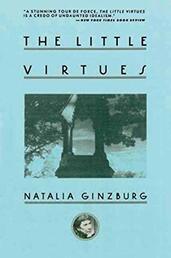 "If...we do not have a vocation, ...then we cling to our children as a shipwrecked mariner clings to a tree trunk; we eagerly demand that they give us back everything we have given them, that they be absolutely and inescapably what we wish them to be, that they get out of life everything we have missed; we end up asking them for all the things which can only be given to us by our own vocation; we want them to be entirely our creation, as if having once created them we could continue to create them throughout their whole lives. We want them to be entirely our creation, as if we were not dealing with human beings but with products of the spirit. But if we have a vocation, if we have not denied or betrayed it, then we can let them develop quietly and away from us, surrounded by the shadows and space that the development of a vocation, the development of an existence, needs. This is perhaps the one real chance we have of giving them some kind of help in their search for a vocation -- to have a vocation ourselves, to know it, to love it and serve it passionately; because love of life begets a love of life." Her words spoke so clearly into an emotion I previously only felt as weight on my shoulders. Here I was, on the cusp of sending all of my kids off to school and feeling like I wanted to launch myself from the identify of “stay at home mom” into “something else.” What something? What title would I seek? Writer. Yes, that sounded right to me. But, can’t you write anywhere? Is the writing what makes it a vocation? If so, then it’s done. I should feel satisfied. For me, it’s a joy to write every day. When I feel overwhelmed by my goals I try to celebrate that. After I walked away from medicine I developed a rhythm of writing every day and felt incredible release and purpose. I embraced being “a stay at home mom who also wrote”. Then, when I was pregnant with my second child, due to emotional overload and physical limitations, I became unable to write. I was depressed about the loss of that space for months. Several years passed and writing once again became something I would do in the future. At some point. Someday. There have been many life interruptions this school year -- our dog getting sick and passing away, our hot water heater expiring, our kids getting sick (again and again and again), school events and other activities -- and yet I am finally (finally!) in more of a writing groove. I am definitely celebrating that. You sense an asterisk, and you are right. Community is also incredibly important to me. I want to be writing and exchanging ideas with a group for a purpose. It lifts me up to hear your comments and hear your stories when you read my blog. Brene Brown defines the two human needs of connection and belonging in this way: “Connection is the energy that is created between people when they feel seen, heard, and valued; when they can give and receive without judgment...Belonging is the innate human desire to be part of something larger than us.” (Daring Greatly, p145). Outside of the blog I am about to pursue the next steps with my writing. First, I registered for a writing class. I have never taken one before, and I worry that no one will like my work! I have talked with contacts in the writing and publishing world and have identified next steps I could take in refining and publishing my own work. All of this has been exciting and intimidating at the same time.
But what about the blog? Why continue? I have a sizeable body of work now. I have a place to direct people to my writing. Why should I keep writing? I realized I didn’t have a concise or clear answer for that. This thought defeated me for a few days, until inspiration hit. “Why should I keep writing” is the wrong question. Here’s the question I want to answer: How can I keep myself from writing? For so long I have wanted to do what is in me to do. And that is put pen to paper. I can’t keep myself from writing any more than I could keep myself from breathing for more than a minute or two. However, what to write about begged re-evaluation. Are you doing this to fulfill some obligation? That question resonated with me because I noticed that I was starting to wonder what to write that my readers might want to read. Thoughts like that added unnecessary stress and were barriers to the creative process. Please, I tell myself, from now on let me write simply what is in me to write. I pour myself out through words, and I need a place to put them. So for now, I will continue with this blog. Today, I celebrate all over again the fact that I have a space for these words. What about you? What is bubbling up in you just begging to be poured out? 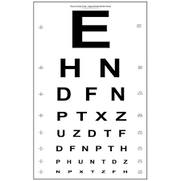 While watching one of my sons swim the other day I made a new friend. Of course, I had already judged this father at least twice before actually speaking to him. This is one of those stories -- the kind where we realize we got it wrong and we are filled with regret for our unkind thoughts. At the first class of the session I had sighed internally as I observed this father watching his swimmer while paying little attention to the younger toddler strapped into a stroller who began periodically and then persistently shrieking. Why not bring something to entertain the little one? How do you expect him to sit there for a thirty minute swim lesson?
During the second lesson I found myself standing next to the man, curious as to what he’d do differently this week and bracing myself for the cries of his child. I tried to focus on the swim lesson in front of me. “Hard to hear what they’re saying from here,” he said to me, making small talk. “What’s that?” I turned to focus on him. “Hard to hear what they’re saying, the instructors,” he gestured out to the classes. “Oh, true,” I agreed. “It’s so loud in here. Then again, I’m deaf in my left ear right now, so I can’t hear much of anything,” I explained. “Ah, well, that makes it hard,” he sympathized, before offering, “I’m legally blind.” That’s usually my line, I thought. After all, when I was in first grade the school nurse called my mother exasperated, asking, “Did you know your daughter is legally blind?” to which, of course, my mother was mortified and said she would take me to be fitted for glasses. This man wasn’t wearing glasses though, and I couldn’t tell if he was wearing contacts. I had no idea why he was telling me he was legally blind, but I didn’t want to get into it right then. I just wanted to watch my son swim. “Makes sense that it would be frustrating not to be able to hear the instructors then if you can’t see them,” I acknowledged. He nodded. “Is the problem with your ear new?” he asked. “Yes. My eardrum ruptured from a middle ear infection.” “How does that happen?” I described the process as best I could using gestures which I fumbled when I found myself wondering if this man could even see my hands. “Is that painful?” “Yes,” I responded, not feeling like going into exactly how painful or how I reacted in those moments when I took it out on my husband. “Is it going to get better?” “Oh yes. The eardrum grows back. This has happened to me before, and I think my hearing was back to normal within a couple of months. It’s already come back a bit, so I think it’ll be similar this time.” The dad nodded, and because this was the vein of small talk we had stepped into, the one in which we exchange comments about our ailments, I asked him about his vision. Figuring this man’s situation was similar to mine, I asked him if his vision was correctable with contact lenses. “No,” he sighed, “I have a disease where my eyesight is degenerating.” “Macular degeneration?” I asked, referring to a common eye disease. “No. I have retinitis pigmentosa.” “Oh,” I said aloud. I felt that sinking gut feeling that comes when you realize you were a jerk for judging someone. Retinitis pigmentosa… I vaguely remembered the condition from medical school. The sum of my retained knowledge: Prognosis not good. “It’s where your retina deteriorates. I found out about it a few years ago, but it’s gotten bad recently. I can’t drive. That’s why we moved over here, so we can be close to the bus and get around that way. I’m home with my kids.” “Gosh, that sounds so hard,” I didn’t know what to say, “I’m home with my kids too.” “Yeah, it’s genetic. But my boys won’t get it. Apparently it gets passed down through the mom. My mom didn’t have it, but I guess she still passed it along to me.” Later, I read more about the condition online and learned that there are dozens of types of mutations that can result in retinitis pigmentosa. The X-linked types are more severe, often resulting in complete blindness. The man added, “The doctors at MGH tell me they’re working on a cure. They said they’ll have one in about ten years.” I was shocked by the matter of fact tone of his voice. His words weren’t logical. How could doctors know what knowledge they would have in ten years? If they know how to obtain the knowledge, why can’t they have it now? Why can’t they help this man now? When the toddler in the stroller dropped his sippy cup, his father groped around on the dimly lit floor for it before finally asking me for help. “Do you see it anywhere?” “Oh yeah,” I chimed in, retrieving the cup. “Here you go.” “Thanks,” he said as he took it from me and returned it to his son. “The hardest part has been learning to ask for help.” “I get that,” I replied, because I did. But I didn’t feel like getting into that either, worried that my stories of learning to ask for help when my twins were born might not compare in the right way to his struggles. After that we “watched” the rest of the swim class. Rather, I watched, and he stared in the direction of his older son. Since then I have tried to be helpful (by retrieving wet paper towels when his son spilled yogurt all over himself and the dad was caught without wipes) without treating him like a cripple. He’s a man who is taking care of his sons the best he can while dealing with his limitations. And as parents, doesn’t that description fit us all? Like a blind man, we too are limited in our sight and understanding of the limitations and struggles that are inevitably present in the lives of those around us. As writer and minister Ian Maclaren first penned, perhaps all we can do is remember to: “Be kind, for everyone you meet is fighting a hard battle.” |
Author's Log
Here you will find a catalog of my writing and reflections. Archives
December 2022
|
